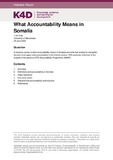| dc.contributor.author | Kelly, Luke | |
| dc.coverage.spatial | Somalia | en |
| dc.date.accessioned | 2022-09-12T12:36:22Z | |
| dc.date.available | 2022-09-12T12:36:22Z | |
| dc.date.issued | 2022-06-22 | |
| dc.identifier.citation | Kelly, L. (2021). What accountability means in Somalia. K4D Helpdesk Report. Institute of Development Studies. DOI: 10.19088/K4D.2022.113 | en |
| dc.identifier.uri | https://opendocs.ids.ac.uk/opendocs/handle/20.500.12413/17629 | |
| dc.description.abstract | This rapid literature review finds that accountability programming in Somalia is focused on working effectively with the country’s hybrid governance. A number of programmes have generated findings on the potential of non-state actors to improve accountability, with a focus on contextual analysis and adaptive programming.
Accountability is defined as mechanisms to hold people in power to account according to an agreed standard. Improving accountability may be difficult in fragile and conflict-affected states such as Somalia where power is dispersed and informal. Somalia is commonly described as a hybrid political order. Regions in Somalia have more and less robust governments and non-state actors have a number of important but informal roles in governance. Moreover, the prevalence of clan-based politics and patriarchal norms limits the inclusivity of accountability mechanisms, with women and members of minority clans among those commonly excluded.
This report is focused on accountability in governance. It surveys both evidence on the status and contours of accountability in Somalia, and on programmes to improve accountability. It is based on evidence from the Implementation and Analysis in Action of Accountability Programme (IAAAP) Somalia programme, as well as other relevant programmes. It describes the findings on the barriers and enablers to greater accountability in Somalia, as well as lessons on implementing programmes. It does not survey every accountability programme, or programme with accountability components, but instead focused on published evaluations and evidence syntheses.
Several programmes, such as IAAAP, have sought to research, improve and learn lessons on accountability in Somalia. IAAAP ran from 2013 to 2019 and had a budget of GBP 23 million. It worked as an innovation laboratory to test models for greater accountability through adaptive programming. IAAAP worked on different themes, including civil society-state engagement, financial flows and extractive industries. | en |
| dc.description.sponsorship | Foreign, Commonwealth and Development Office (FCDO) | en |
| dc.language.iso | en | en |
| dc.publisher | Institute of Development Studies | en |
| dc.relation.ispartofseries | K4D Helpdesk Report;1166 | |
| dc.rights.uri | https://www.nationalarchives.gov.uk/doc/open-government-licence/version/3/ | en |
| dc.subject | Governance | en |
| dc.title | What Accountability Means in Somalia | en |
| dc.type | Helpdesk | en |
| dc.rights.holder | © Crown copyright 2022 | en |
| dc.identifier.doi | 10.19088/K4D.2022.113 | |
| dcterms.dateAccepted | 2022-06-24 | |
| rioxxterms.funder | Default funder | en |
| rioxxterms.identifier.project | K4D | en |
| rioxxterms.version | VoR | en |
| rioxxterms.versionofrecord | 10.19088/K4D.2022.113 | en |
| rioxxterms.funder.project | 42a141a4-4b80-406f-9c57-3bb186f136c1 | en |

